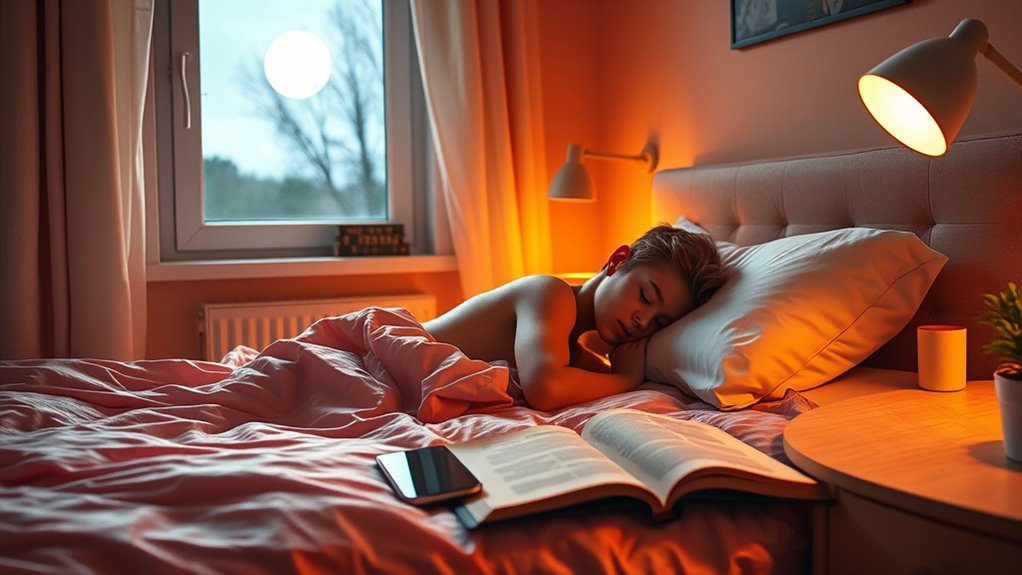To help teens develop healthy sleep habits, encourage them to stick to a consistent schedule, even on weekends, and avoid screens an hour before bed. Limit caffeine and heavy meals in the evening, and create a calming routine to wind down. Make sure their bedroom is cool, dark, and quiet for better rest. If issues persist, seeking professional guidance can be beneficial. Keep exploring to discover more strategies for supporting your teen’s sleep health.
Key Takeaways
- Establish a consistent sleep schedule, even on weekends, to regulate the teen’s internal clock.
- Limit screen time at least one hour before bed to reduce blue light exposure and improve sleep quality.
- Create a calming pre-sleep routine, such as reading or practicing relaxation techniques, to signal readiness for sleep.
- Keep the bedroom environment cool, dark, and quiet to promote restful sleep.
- Encourage healthy lifestyle habits like reducing caffeine and heavy meals before bedtime.

Have you ever wondered why teenagers often stay up late and still feel tired during the day? It’s a common scene in many households, and it’s often linked to teen sleep deprivation. As a teen, your body is going through rapid changes, and sleep plays an essential role in supporting your physical and mental development. Unfortunately, many adolescents don’t get enough rest, partly because of busy schedules, social media, and school demands. This lack of sleep can lead to difficulties concentrating, mood swings, and even weakened immune function. Understanding adolescent sleep hygiene—the habits and routines that promote good sleep—is fundamental to breaking this cycle.
Teen sleep patterns change during adolescence, affecting physical and mental health. Establish good sleep routines to stay rested and healthy.
Teen sleep deprivation isn’t just about staying up late; it’s also about the quality of sleep you’re getting. Your internal clock, or circadian rhythm, naturally shifts during adolescence, making it harder to fall asleep early. Yet, many teens try to go to bed at the same time as younger children, which doesn’t align with their biological sleep patterns. As a result, you might lie in bed for hours, frustrated and restless, yet still wake up feeling exhausted. To combat this, establishing good adolescent sleep hygiene is essential. This includes setting a consistent sleep schedule, even on weekends, so your body learns to anticipate rest at specific times. Avoid screens at least an hour before bed, as the blue light emitted by phones and computers can interfere with melatonin production—the hormone that signals your body it’s time to sleep. Additionally, somatic therapy techniques like deep breathing or relaxation exercises can help reduce stress and ease the transition into sleep.
Creating a calming pre-sleep routine can also make a big difference. You might try reading a book, taking a warm shower, or practicing relaxation techniques like deep breathing or meditation. Keep your sleeping environment cool, dark, and quiet to foster better sleep conditions. Limiting caffeine and heavy meals close to bedtime can further improve your chances of falling asleep quickly and staying asleep through the night. Remember, your brain and body need sufficient rest to function at their best—your memory, mood, energy levels, and even academic performance depend on it.
If you’re struggling with sleep issues, don’t hesitate to seek support. Talk to a healthcare professional or a sleep specialist who can help identify underlying problems. Building healthy sleep habits doesn’t happen overnight, but with consistency and effort, you can improve your sleep quality and overall well-being. Prioritizing teen sleep deprivation and adolescent sleep hygiene isn’t just about feeling rested; it’s about setting yourself up for a healthier, more vibrant life.
Frequently Asked Questions
How Does Screen Time Affect Teen Sleep Quality?
Your screen time, especially exposure to blue light from devices, can markedly impact your sleep quality. Blue light suppresses melatonin, making it harder to fall asleep. Additionally, social media impact keeps your mind active and engaged, delaying bedtime and disrupting rest. To improve sleep, limit screen use before bed and consider using blue light filters. Prioritizing screen-free time helps your body produce melatonin naturally, leading to better sleep.
What Are the Signs of Sleep Deprivation in Teens?
You might notice your teen feeling constantly tired, irritable, or having difficulty concentrating. They may also struggle with falling asleep or waking up feeling unrefreshed. Poor sleep hygiene and an unsuitable sleep environment, like too much screen time or noisy surroundings, can worsen these signs. Keep an eye on their habits and create a calming sleep environment to help improve their sleep quality and overall well-being.
Can Napping Replace Nighttime Sleep Effectively?
Think of napping as a quick pit stop, but it can’t replace a full tank of nighttime sleep. Historically, sleep trends show that teens need about 9 hours, yet cultural attitudes often undervalue nighttime rest. While a short nap can boost alertness, it doesn’t fully compensate for lost sleep, and frequent reliance on naps may signal sleep deprivation. Prioritize consistent, quality nighttime sleep for your best health and performance.
How Do Hormonal Changes Impact Adolescent Sleep Patterns?
Hormonal shifts during adolescence considerably impact your sleep regulation, making it harder to fall asleep early and stay asleep through the night. These hormonal changes, especially in melatonin production, delay your internal clock, causing later bedtimes and wake times. As a result, you might feel tired during the day. To adapt, prioritize consistent sleep schedules and create a calming bedtime routine that supports your body’s natural rhythms.
Are There Specific Foods That Promote Better Sleep in Teens?
You can help your teen sleep better by offering sleep-promoting snacks and sleep-friendly foods. Foods rich in tryptophan, like turkey, bananas, and dairy, boost melatonin production, improving sleep quality. Incorporate whole grains, nuts, and seeds into their diet, as these provide magnesium and healthy fats that support relaxation. Avoid caffeine and sugary snacks before bed, ensuring your teen’s diet encourages restful sleep and helps establish healthy sleep habits.
Conclusion
Getting enough sleep is vital for your teen’s health and success. Did you know that nearly 73% of adolescents don’t get enough sleep on school nights? By helping your teen establish healthy sleep habits, you’re giving them the best chance to thrive academically, emotionally, and physically. Remember, small changes can make a big difference. Prioritize sleep, set consistent routines, and watch your teen flourish with the rest they need.









